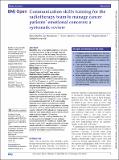Files in this item
Communication skills training for the radiotherapy team to manage cancer patients’ emotional concerns : a systematic review
Item metadata
| dc.contributor.author | van Beusekom, Mara Myrthe | |
| dc.contributor.author | Cameron, Josie | |
| dc.contributor.author | Bedi, Carolyn | |
| dc.contributor.author | Banks, Elspeth | |
| dc.contributor.author | Humphris, Gerald Michael | |
| dc.date.accessioned | 2019-04-22T09:30:01Z | |
| dc.date.available | 2019-04-22T09:30:01Z | |
| dc.date.issued | 2019-04-20 | |
| dc.identifier | 257823049 | |
| dc.identifier | 94a04f4a-74cf-42a1-9477-ec374a8a9711 | |
| dc.identifier | 85064964307 | |
| dc.identifier | 000471157200115 | |
| dc.identifier.citation | van Beusekom , M M , Cameron , J , Bedi , C , Banks , E & Humphris , G M 2019 , ' Communication skills training for the radiotherapy team to manage cancer patients’ emotional concerns : a systematic review ' , BMJ Open , vol. 9 , e025420 . https://doi.org/10.1136/bmjopen-2018-025420 | en |
| dc.identifier.issn | 2044-6055 | |
| dc.identifier.uri | https://hdl.handle.net/10023/17564 | |
| dc.description | Funding: Breast Cancer Now, grant number 2017MayPR898. | en |
| dc.description.abstract | Objectives: Many cancer patients experience high levels of anxiety and concern during radiotherapy, often with long-lasting effects on their well-being. This systematic review aims to describe and determine the effectiveness of communication skills training (CST) for the radiotherapy team (RT) to improve conversations in this setting and to support patients with emotional concerns. Design: Systematic review. Interventions: CST for RT members. Data sources: On 17 April 2018, databases Medline, Embase, Scopus and PsycNET were searched. Eligibility criteria, Population, Intervention, Comparison, Outcome(PICO): Quantitative and/or qualitative articles were included that evaluate the effect of a CST for RT members (vs no CST) on communication behaviours and patients’ emotional concerns. Data extraction and synthesis: Articles were appraised using the mixed-methods appraisal tool, and a narrative synthesis was performed. Results: Of the nine included articles, five were randomised controlled trials, three were mixed-methods and one used repeated measurements. Four of the five different CST programmes managed to increase emotional communicative behaviour from the RT, and all studies measuring patient communicative behaviour found an improvement in at least one of the hypothesised outcomes. Two studies examining patient anxiety and concerns found a positive effect of the CST, although one found a negative effect; two other studies without a positive effect on mood made use of both empathic CST and tools. Conclusions: There are promising indications that CST can be successfully introduced to improve emotional conversations between RT members and patients. With the right support, the RT can play an important role to help patients cope with their emotional concerns. Future work is necessary to confirm initial promising results and to ensure the learnt communication skills are sustained. | |
| dc.format.extent | 11 | |
| dc.format.extent | 948666 | |
| dc.language.iso | eng | |
| dc.relation.ispartof | BMJ Open | en |
| dc.subject | RC0254 Neoplasms. Tumors. Oncology (including Cancer) | en |
| dc.subject | SDG 3 - Good Health and Well-being | en |
| dc.subject.lcc | RC0254 | en |
| dc.title | Communication skills training for the radiotherapy team to manage cancer patients’ emotional concerns : a systematic review | en |
| dc.type | Journal item | en |
| dc.contributor.institution | University of St Andrews. Population and Behavioural Science Division | en |
| dc.contributor.institution | University of St Andrews. WHO Collaborating Centre for International Child & Adolescent Health Policy | en |
| dc.contributor.institution | University of St Andrews. Health Psychology | en |
| dc.contributor.institution | University of St Andrews. St Andrews Sustainability Institute | en |
| dc.contributor.institution | University of St Andrews. School of Medicine | en |
| dc.contributor.institution | University of St Andrews. Sir James Mackenzie Institute for Early Diagnosis | en |
| dc.identifier.doi | 10.1136/bmjopen-2018-025420 | |
| dc.description.status | Peer reviewed | en |
| dc.date.embargoedUntil | 2019-04-20 |
This item appears in the following Collection(s)
Items in the St Andrews Research Repository are protected by copyright, with all rights reserved, unless otherwise indicated.

